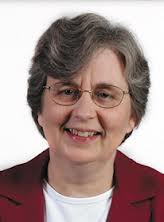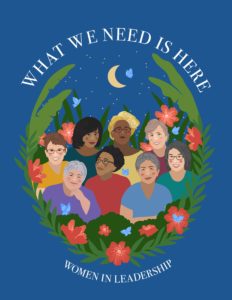 Linda Gehman Peachey is a freelance writer living in Lancaster, Pennsylvania. She has a Master of Divinity from Anabaptist Mennonite Biblical Seminary, Elkhart, Indiana, and a Doctor of Ministry from Lancaster Theological Seminary. Previously, Linda worked for Mennonite Central Committee (MCC) on women’s concerns and also served with her husband, Titus, as co-director of Peace and Justice Ministries. They also worked in Laos with MCC, 1981-1985. She and Titus have two adult daughters and enjoy visiting them in Chicago and Guatemala. She is a member of East Chestnut Street Mennonite Church in Lancaster. Linda is also a member of MC USA’s Women in Leadership steering committee.
Linda Gehman Peachey is a freelance writer living in Lancaster, Pennsylvania. She has a Master of Divinity from Anabaptist Mennonite Biblical Seminary, Elkhart, Indiana, and a Doctor of Ministry from Lancaster Theological Seminary. Previously, Linda worked for Mennonite Central Committee (MCC) on women’s concerns and also served with her husband, Titus, as co-director of Peace and Justice Ministries. They also worked in Laos with MCC, 1981-1985. She and Titus have two adult daughters and enjoy visiting them in Chicago and Guatemala. She is a member of East Chestnut Street Mennonite Church in Lancaster. Linda is also a member of MC USA’s Women in Leadership steering committee.
__________________________________
One question that keeps haunting me is from Chanequa Walker-Barnes’ book, “I Bring the Voices of My People.” She asks: “What does it mean to know that a system is evil and to participate in it anyway?”[1] In truth, how does this shape us? And who have we become as a result?[2]
Of course, there are many dreadful systems in our world today, all forming us in harmful ways: militarism, consumerism, exploitation of the earth, patriarchy and white supremacy. These are all powerful forces, promising security, comfort and order. Yet, they have yielded so much violence, destruction and oppression. Certainly, those who see this best are often on the underside of these forces: those who directly experience war, the destruction of their environments, sexual violation and racial oppression.
What we often fail to ask is what happens to those expected to reap the benefits of these systems. How are those at the top shaped by these forces? What happens to people who put most of their resources into military solutions and extract all they can from the earth? What happens to men asked to constantly compete for dominance? And what happens to white people who comply with a supremacist vision of white superiority and control?
I admit that this last question is the newest one for me. I have seen firsthand the extensive trauma and destruction caused by the first several forces, but it’s taken longer for me to understand the damage caused by white supremacy. As a white woman, I am on the upper side of this structure and the extent of the damage hidden beneath many layers of separation and distortion.
Nevertheless, I am coming to understand that the ideology built around whiteness has harmed everyone, including those whom it claims to benefit.
I should emphasize that there is nothing wrong with being born white. All races are beloved by God. What is wrong is how whiteness has been used by powerful forces in our country to assess worth and access to resources and rights, to assign privilege and value to some people and not to others. This system has wreaked so much destruction over the generations and continues to play out in police violence, mass incarceration, hate crimes and economic exploitation. The list could go on and on. And the costs are incalculable.
These realities should be cause enough for us to seek change. But as Walker-Barnes suggests, white people might also ask themselves how white identity has harmed and distorted themselves. For example, white identity:
- Makes friendship across racial lines fraught with much doubt and suspicion.
- Assumes white values of beauty, self-sufficiency and achievement are universal norms, with little room for alternative values.
- Insists that white people have the right to be at ease and comfortable, without being challenged or asked to face difficult questions.
- Promotes a false understanding of history, keeping white people bound in a dangerous web of lies and deceptions.
- Teaches white people not to trust the witness of BIPOC (Black, Indigenous, People of Color) people, even when BIPOC describe their own experiences.[3]
- Encourages white people to assume their presence or involvement in a situation is always a good thing rather than potentially “extractive and violent.”[4]
- Robs everyone of the richness, truth and wisdom found in diverse peoples and cultures.
In truth, white supremacy works to blame the most vulnerable among us rather than recognize the oppressive economic and political forces that are actually at work.
This makes it difficult to assess what truly endangers everyone’s well-being and work fruitfully for transformative change. Indeed, as revealed so dramatically on Jan. 6, 2021, this ideology is even willing to threaten the very existence of democracy in this country.
Furthermore, white supremacy causes deep moral injury, as white people are caught in a system they know is wrong. [5] This makes it hard to develop a healthy spirituality that can be fully transparent and honest before God and others. It requires white people to distort their psyche and moral compass, in order to live with a system of so much brutality and injustice. It is a painful disease that calls into question white people’s integrity and willingness to be loved and guided by a God who truly loves all people.
To be clear, moral injury is not the same as trauma. This situation, as experienced by white people, is not the same as that of those who have suffered the direct effects of racist violence, hate and oppression. Still, it is a wound that needs to be understood and cared for.
What might this mean for me? Unfortunately, there is no easy step to take, no quick fix, that can remove my responsibility or excuse my participation in this system. And in truth, none of us can ever fully extricate ourselves from these principalities and powers.
But Jesus does invite us on a journey. A journey which will require honest learning, humility, collaboration, courage, a willingness to be held accountable and a steadfast commitment to seeking justice with others. As a white person, it means working to transform white culture from one of exceptionalism and arrogance to one of living and working with everyone in true humility and partnership. It means repentance and following Jesus on the way to life. It means opening myself to the transforming love God pours out on all her children.
[1] Chanequa Walker-Barnes, “I Bring the Voices of My People, A Womanist Vision for Racial Reconciliation.” (Grand Rapids, Michigan: Wm B. Eerdmans, 2019), 125. Original italics removed.
[2] Ibid., 128.
[3] Kelly Brown Douglas, “Resurrection Hope, A Future Where Black Lives Matter,” Maryknoll, New York: Orbis Books, 2021), 67-68, 84-95.
[4] Christina Cleveland, “God is a Black Woman” (New York: HarperCollins, 2022), 218.
[5] Walker-Barnes, 125-131.

MC USA’s Women in Leadership (WIL) works to dismantle patriarchal systems in Mennonite Church USA by empowering women to live out the call of God on their lives, increase their capacities, and contribute their wisdom in congregations, area conferences, agencies and institutions.

